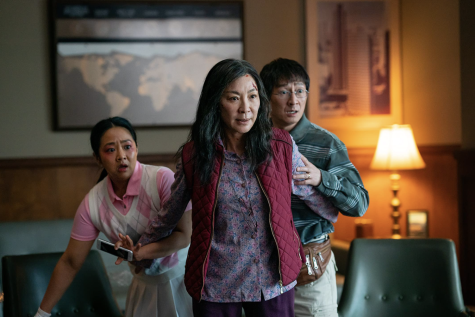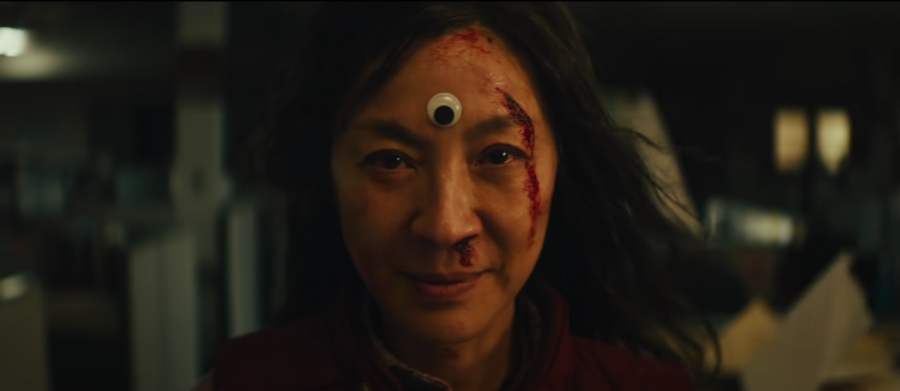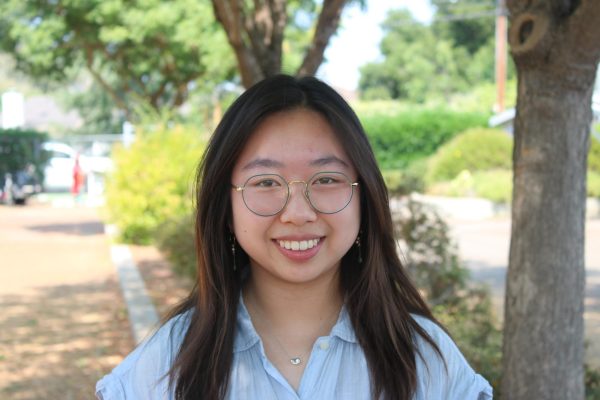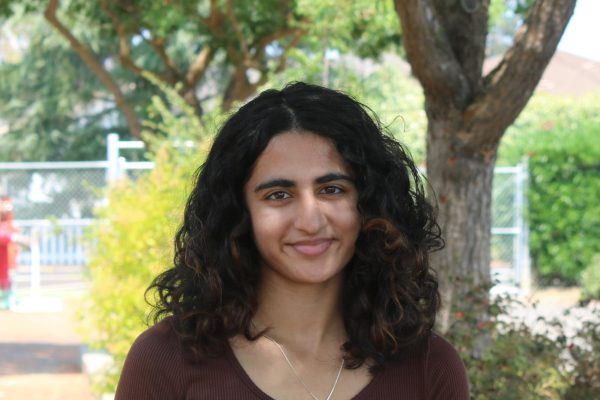“Everything Everywhere All At Once” sets new standards for Asian representation
Evelyn Wang, played by Michelle Yeoh, places a symbolic third eye on her forehead in the form of a googly eye. The recent success of “Everything Everywhere All At Once” at the Oscars shows the growing demand for genuine representation and how films centered around Asian cultures deserve their place in mainstream Hollywood.
A year following its release, “Everything Everywhere All At Once” has returned to select theaters for screenings of the critically-acclaimed film that recently won seven Oscars. In a visually-striking genre-bending account of what happens when different universes collide, the film puts a spotlight on the Chinese-American experience.
“Everything Everywhere All at Once” stars Evelyn Wang played by Michelle Yeoh, a Chinese American immigrant running a laundromat with her husband, Waymond Wang played by Ke Huy Quan. As the movie progresses, Evelyn goes from stressing about her estranged father and a tax audit to fighting a multiversal entity set on destroying universes.
For years to come, this movie will set the standard for meaningful representation in cinema. It decisively shows the difference between simply casting actors of a certain ethnicity, and honestly representing a culture on screen. The film masterfully melds modern-day Asian-American culture and traditional Chinese values, delivering a genuine and vulnerable statement that proves Asian stories and voices have a permanent place in mainstream Hollywood.

Michelle Yeoh, a standout force of acting prowess throughout the film, is now the first Asian woman to win an Academy Award for Best Actress in a Leading Role. But she is most definitely not the first Asian woman to shine on the silver screen — it is simply a matter of recognizing and rewarding the work of women of color throughout an industry they are largely ignored in.
Along with Yeoh, the cast included actor James Hong who played Gong Gong, Evelyn’s somewhat-estranged father. The 94-year-old actor, with over 450 movie credits to his name and nearly 70 years of experience, can still recall when yellowface was rampant and white actors playing Asian characters was the norm.
“Producers said Asians were not good enough and they are not box office,” Hong said during the Academy Awards. “But look at us now.”
Just like films such as “Parasite” and “Crazy Rich Asians” have done in the past, “Everything Everywhere All At Once” breaks new ground in proving that a primarily Asian cast can have the power to sway the box office and keep the world entertained.
One of the most striking features of the movie was its focus on the mundane, allowing the everyday details of the Wang family’s lives to paint a vibrant picture of Asian-American culture. Despite primarily being marketed toward American audiences, the film incorporates fluid code-switching — characters start conversations in English and end them with Mandarin or Cantonese, and vice versa.
As the language and dialect switching picks up pace, characters are yanked from the comfort of their mother tongues, and language becomes a symbolic split as both multiverses and disparate cultures start pulling Evelyn apart.
Even the range of how each character speaks English is a thoughtful choice that highlights an essential part of Asian-American culture. The movie doesn’t shy away from the fact that when immigrants learn English as a second language, they often retain an accent or speak broken English. But the film doesn’t treat this as a flaw, instead it embraces it as an integral part of the characters and their community.
Older Asian immigrants such as Evelyn occasionally have difficulty communicating with their slightly stilted English accent, and the film acknowledges how Evelyn feels belittled because of it. But the audience never sees her as less intelligent or capable because of it. Yeoh and Huy Quan come from multilingual families and used their experiences to create a blend of languages in a way that was natural to them.
“We wanted it to sound and be authentic, because this whole family was real,” Yeoh said in an interview with Comics Beat. “This is the only way to portray it — the chaos in a family household. Even if they might not know exactly what the words are saying, they understand because the gesture and the body language speak volumes already on their own.”
The Asian nuclear family is one that is often misrepresented on Hollywood’s screens, tainted by stereotypes of “tiger moms” and distant families. Asian mothers in particular are rarely Hollywood’s desired protagonists. When they do show up on screen, they’re often tropified into the punchline of a joke, the authoritarian and borderline abusive parent whose emphasis on academic success perpetuates the model minority myth.
But this film takes a different approach to the fraught Asian mother-daughter relationship, painting a more complete picture of how a cultural divide and a mother’s fierce love can clash. While technically accepting of Joy’s girlfriend, Evelyn clashes with Joy on whether or not to tell Evelyn’s visiting father, Gong Gong, about Joy’s sexuality. Throughout the film, she struggles to tell her daughter how much she cares for her, instead opting for the stereotypical “you are getting fat” comment.
While the lack of verbal affirmation is raw and heartbreaking, there is never a moment where the audience is in doubt of Evelyn’s love for Joy. Her continued sacrifice for a chance to save her daughter and desperate attempts to protect Joy leave no room to question the extent she’d go for her daughter.
The film dispels archetypal clichés while portraying the unyielding strength of a mother’s love for her daughter. And while that love is imperfect, it shows the lived realities of many Asian-American children, struggling to understand their parents’ love may not look the same as the typical Hollywood family, but that it in no way adulterates their affection. The film understands and recognizes generational gaps between immigrant parents and their children, but portrays them sensitively and with elegance.
This form of representation goes beyond casting someone with the right skin color, but focuses on the nuances of a culture, unabashedly portraying the good and the bad. There’s more to representation than seeing yourself on a screen, and this film exemplifies exactly how meaningful it is to feel that you and your culture are seen and cherished by audiences of all types.
In his Oscar acceptance speech, Huy Quan thanks his parents and the Academy Awards for the opportunities he’s had to showcase his culture. He tearfully urges the audience to hold onto their dreams, because their time will come.
“To all those at home who are watching, who are struggling and waiting to be seen, please keep on going because the spotlight will one day find you,” Huy Quan said.






